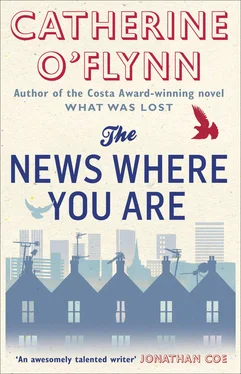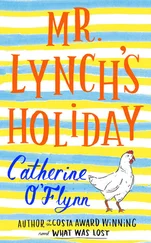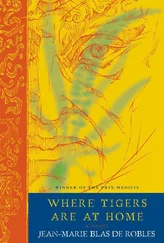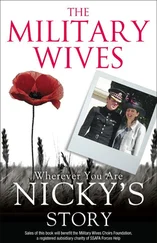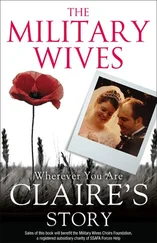‘But Bosker’s a legend. The correspondent without portfolio. They just sacked him?’
‘They offered him general reporter, but he told them to shove it. They know he’s not going to learn how to use a video camera at his age.’
Frank shook his head. ‘I suppose it’s been coming. He doesn’t really fit in with the programme now, but bloody hell, Steve Bosker. End of an era.’
‘He doesn’t fit in because he has a personality. He’s not just some pretty-boy replicant off the production line.’
‘Those leather gloves were his trademark, those and the tinted glasses — he was the assassin. There was something very theatrical about him.’
‘They’re not interested in that local-colour stuff any more. He said they didn’t want stories about inanimate objects.’
‘What?’
‘Haunted houses. Historic stretches of canals. Industrial heritage. Inanimate. The viewers are like panting dogs — they like to follow moving objects. Living, breathing things — kids in hospital waiting for operations, pensioners who’ve had their medals stolen, gang members shooting each other.’
Frank sighed. ‘I suppose that’s understandable.’
Bucknall took a long drink of his mild. ‘Do you remember that phase he went through of always being filmed between branches or partially obscured by leaves?’
‘Yeah — “Citizen Kane” Phil used to call him.’
‘He was wasted on us really. The auteur of local news.’
‘The best Bosker story, though, was the Tamworth child snatcher.’
Bucknall frowned. ‘I don’t remember that.’
‘It was ages ago — maybe early nineties, I’m not sure. Anyway some bloke in a van was hanging around primary schools in Tamworth and making inept attempts to snatch kids — you know, offering them lifts to the sweet shop, that kind of thing. He actually got one, but she managed to jump out at some traffic lights. There were loads of complaints to the police and so we ran the story over a few nights. There was a lot of panic; every parent in Staffordshire thought their kid would be next. I mean, to be honest, I never thought this bloke was much of a threat — he seemed a bit of a joke to me — but you can imagine the hysteria. Anyway, on the second night the police had given us an artist’s impression based on the kids’ descriptions. Do you really not remember this?’
Bucknall shook his head.
‘Well, we showed the artist’s impression and as the report was running Phil turned to me and said, “Did you notice anything about that image?” I hadn’t really looked at it. So I took a look and that was it. Both Phil and I were in bits. It was a real struggle to get our act together back in time for the next item.’
‘What was the joke?’
‘The face of the child snatcher — it was Bosker. The tinted glasses, the wiry hair — I mean it was a striking resemblance. In fact, if it wasn’t for the fact we knew exactly where he’d been at the times of the incidents, we’d probably have shopped him. Anyway, as bad luck would have it, the next item straight after that was a Bosker special — a report on some new water-park opening in Coleshill. I swear the moment his face appeared on screen the phones started ringing. I think we had over a hundred calls alerting us to the fact that the Tamworth child snatcher was working for us.’
Bucknall laughed.
‘Luckily they got the bloke in a few days, but Bosker never worked in Staffordshire after that for fear of reprisals.’
‘Those were the days, eh?’
‘Yeah.’
‘I mean you wouldn’t get any of those gimps we have reporting now being mistaken for predatory paedophiles.’
‘Sad times indeed.’
‘Talking of sad times, I’ve got to get off to have a chat with Rentaquote Reeves to see what words of wisdom he has to say about the suspension of the regeneration project.’
‘I suspect he’ll be outraged.’
‘I suspect you’re right. If his party was running the council, the local car industry wouldn’t have hit the wall, the global recession wouldn’t have happened and Britain would win Eurovision every year.’
‘Why, you sound jaded, Donald. As if you’ve heard it all before.’
Bucknall finished his pint. ‘Well, we have, haven’t we, Frank. All of the stories, all of the faces. Heard them, seen them a million times.’
He was watching what he assumed was Evergreen’s Sing Something Simple group. He’d seen notices for them pinned about the place and when he’d heard the music in the corridor he’d followed it to the glass door where he now stood.
They sat on a circle of plastic chairs — their walking sticks, newspapers and cardigans scattered about them. Someone he didn’t know played the guitar and the group sang along. Frank recognized ‘Over the Rainbow’. He had heard it a hundred times and it had always been a song that floated past and never stuck to him. Hearing it now, though, Frank felt a soaring sensation in his chest. It was the same reaction he experienced sometimes on catching a glimpse of Mo, or Andrea’s silhouette separating from a crowd, or on seeing a sudden hurtling of vivid yellow leaves along a black road. For a moment he was overwhelmed, the very rhythm of his heart affected by the impact of what he saw and heard. He found the sight now of these few people each holding on to their stapled sheets of song words, combined with the melody and the lyrics, pierced him deeply. Each time the chorus came round the members of the group raised their heads, freed from the need to follow the words, and looked across at each other as they sang the well-known lines. Frank believed that what he was experiencing was not the power of one song, but the power of music itself, the transcendental, transformational magic, and he’d never felt it so purely before.
After the song finished there was a brief moment of stillness, a savouring of the suspension of the world, before time and place asserted themselves once more. Song sheets were passed back to the man with the guitar, assorted belongings reached for, cups of tea considered, the difficult business of standing up negotiated. As the circle broke apart, and chairs moved backwards, Frank was able to see figures previously obscured by others. He noticed for the first time that Walter had been sitting on the left-hand side of the group and as he leaned backwards to reclaim his newspaper Frank saw someone else he recognized by his side. It took a split second for him to realize it was his mother. He quickly pulled his head back, and turned and walked away from the room.
He returned to his car without really knowing why and sat with the heater on, looking at the exterior of Evergreen. Damp bark chippings covered the ground and wire cages encircled the skinny trunks of bare sapling trees. A garden intent on suppressing life.
A few nights previously he had spent hours looking through old family photographs that Mo had pulled out when looking for photos of her grandfather. The piles of battered Kodak photo wallets tumbled over the table, a chaos of negative strips spilling out and mingling promiscuously across the packs. Andrea was impressed by the photos of his parents before they were married. The images seemed poised and graceful — of a far higher quality technically and formally than any photos Frank and Andrea took now with a more sophisticated camera. The wallets were in no order and so they zigzagged through time from tiny, white-bordered, black and white rectangles, to gaudier, full-gloss jumbo shots and back again. Frank changing from scowling baby to smiling father to squinting young boy shielding his eyes from the sun.
Andrea had seen them all before but enjoyed seeing them again. Her enjoyment turned to outright hilarity around the time of Frank’s thirteenth birthday as she howled at the photos of teenage Frank with his sensible haircut and jumpers. As the evening wore on, Frank found himself focusing most on the face of his mother. He compared the very old photos of her with later ones and tried to work out what it was that had changed beyond the simple process of ageing. It was something to do with her smile. At some point it had lost its softness, and took on a brittle, artificial quality. Her face showed effort, her eyes squinted. It was as if one day she had forgotten how to smile naturally and was forced to follow instructions from a manual.
Читать дальше
